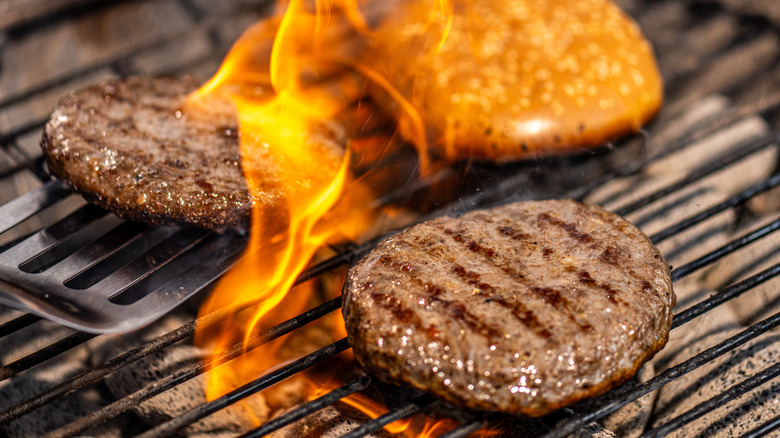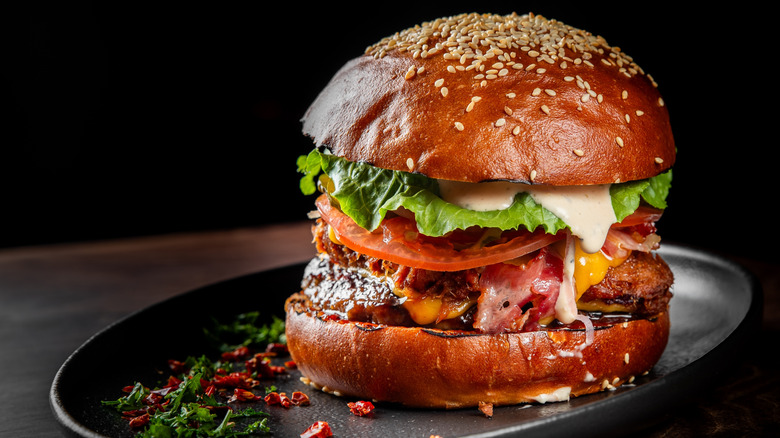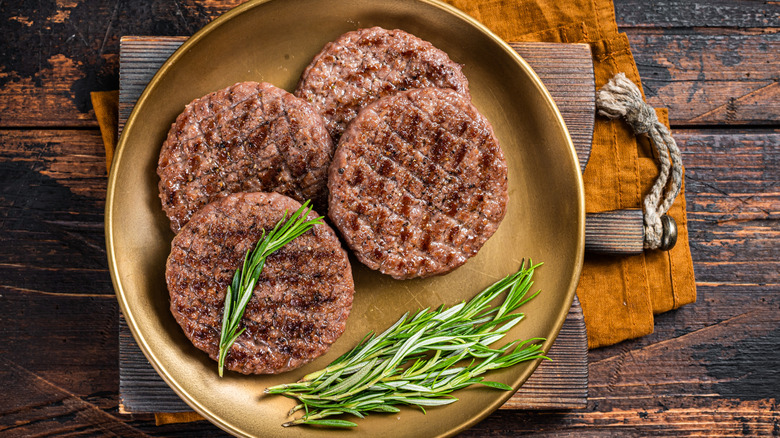Is There Any Hope To Fixing An Overcooked Burger?
We may receive a commission on purchases made from links.
It may seem like a fairly straightforward dish, but there's actually a lot to consider when it comes to a hamburger — from the right way to hold it so it doesn't fall apart, to the proper way to layer toppings. While it's true that hamburgers tend to taste better at restaurants, a darn tasty burger can still be executed at home if you're savvy about technique.
Even if you flub up your cooking efforts, some expert tactics can help bring an overcooked hamburger back from the edge of oblivion. For some insider tricks on how to do this, Food Republic spoke with Peace, Love and Low Carb food blogger and international bestselling cookbook author Kyndra Holley, who had some excellent wisdom to share. "[While] you can't undo overcooking, you can improve a dry, tough burger with a few tricks to reintroduce moisture, soften the texture, and boost flavor," she explained.
One way to counteract an overdone hamburger is to give it a quick steam treatment. "Place the burger in a covered skillet with a splash of broth or water," Holley instructed. "Let it steam over low heat for [one to two] minutes. This helps soften the meat without cooking it even further. You can also add a little butter to the broth to add richness." A similar approach for reintroducing moisture is to wrap up the patty "in foil with a little bit of butter and let it sit for [five] to 10 minutes," Holley advised. "The steam will help rehydrate the surface and tenderize slightly."
Toppings can go a long way in rescuing an overcooked burger
Kyndra Holley also served up some good topping choices that can help offset an overly done, overly dry burger patty. Sauteed onions or mushrooms, especially paired with butter or balsamic, can lend a "soft, juicy, and umami-rich" touch, she shared, adding that the creamy fat of an avocado or some guacamole can also counteract dryness, as can the richness and moisture of a fried egg — we'd suggest either sunny-side up or over-easy.
Other veggie toppings can be a big help, too. Pickles can "add crunch and acid to cut through dryness," Holley explained, going on to suggest that sliced tomato can lend moisture, and quick-pickled onions can punch up a dry patty with vibrance and zing. Creaminess and brightness can be applied in the form of a vinegar- or mayonnaise-based slaw.
In terms of cheese choices, Holley shared that a meltier option — like "American, cheddar, provolone, or even brie" — can greatly help juice up your burger. And when it comes to sauces, she suggested that garlic aioli, avocado ranch, or barbecue sauce would all be invaluable for imbuing moisture back into a patty.
When all else fails, a tough hamburger can always be repurposed, too. "If it's still too dry, chop or crumble it and ... turn it into sloppy joes, taco meat, or throw it in a stir fry," Holley suggested.
How to avoid overcooking your burger in the first place
While being armed with rescue skills is helpful, there are various preventative measures that can help you avoid overcooking your beef to begin with. Kyndra Holley suggests using a thermometer when cooking up burgers, and pulling your meat off the heat about five degrees before your patty has reached its target temperature (whether you're aiming for medium-rare, well done, etc.). You should also handle your beef gently and avoid overworking the patties. "Loose patties [equal] juicier burgers," Holley explained.
Impressing a thumbprint shape into the center of your patties can help the meat "cook evenly without puffing up" — a phenomenon that can tempt a cook to press the patties flat, which you shouldn't do. "Pressing the patty with a spatula while cooking squeezes out moisture," Holley cautioned.
Holley explained that cooking your burgers on medium-high heat, rather than higher temperatures, also helps the beef fry up evenly. Getting the temp too high can lead to a burned exterior while the inside isn't yet done cooking. You should also resist the urge to move your patties around too much. "Flip once," Holley advised. "Let a crust form, then flip. No constant flipping." Finally, let your cooked meat rest for around three to five minutes, which "[locks] juices in," she shared.



